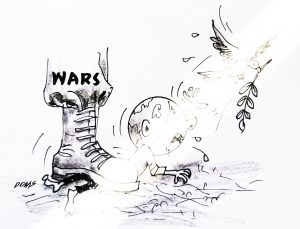While the desire for peace is universally shared, achieving lasting tranquility has proven challenging. Several reasons can be attributed to this ongoing struggle, including geopolitical conflicts, ideological differences, and socioeconomic disparities. The increasing power dynamics among nations, coupled with the rise of non-state actors, have further complicated the pursuit of peace.
Geopolitical conflicts are a significant contributing factor to the difficulty in establishing and maintaining global peace. These conflicts arise from territorial disputes, power struggles, and competition for resources among nations. The need to safeguard national interests often takes precedence over long-standing diplomatic efforts, leading to a perpetual state of tension and hostility. The involvement of powerful nations in proxy conflicts exacerbates the situation, perpetuating a cycle of violence beyond the boundaries of the original dispute.
Ideological differences pose another significant challenge to peace in today’s world. Conflicting religious beliefs, political ideologies, and cultural norms fuel intolerance and divisiveness, making peaceful coexistence and cooperation seemingly unattainable. These differences are often exploited by extremist groups to propagate violence and hatred, further destabilizing already volatile regions. Bridging ideological gaps requires a concerted effort to promote dialogue, cooperation, and mutual understanding. With individuals and groups becoming increasingly entrenched in their positions, finding common ground becomes an arduous task, perpetuating the elusiveness of peace.
Socioeconomic disparities are a crucial but often overlooked aspect contributing to the lack of peace in the modern world. Unequal distribution of resources, wealth, and opportunities breeds resentment and fuels social unrest. Poverty, unemployment, and lack of access to education and basic services push marginalized populations toward radicalization and violence. Addressing these socioeconomic disparities is vital for long-lasting peace, as it requires equitable distribution of resources, inclusive economic policies, and sustainable development efforts.
The dynamics of power in international relations have significantly changed, rendering peace even more elusive. The rise of non-state actors, such as terrorist organizations or transnational criminal networks, challenge the traditional framework of peace-building. These actors operate outside the purview of state control and often exploit power vacuums, fostering instability. Effectively combating these non-state actors requires coordinated global strategies, intelligence-sharing, and collective action.
Only through collective efforts can we hope to navigate the complexities of the contemporary world and strive to achieve the elusive goal of peace.




